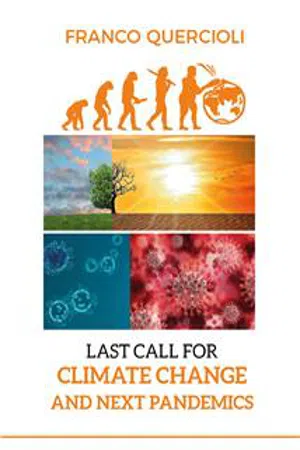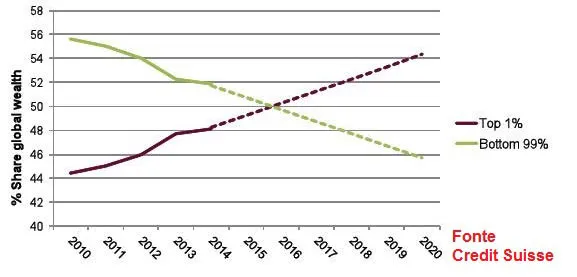![]()
CHAPTER 1
Globalized capitalism and inequalities
In this chapter I just want to give you a very quick overview of why the capitalist economic system, now adopted almost all over the world, is the origin and main cause of global warming.
For a more in-depth discussion from an economic and social point of view, I invite you to read my first book "The Last Mission of Humanity".
Growth of capitalism and well-being in industrialized countries.
From the dawn of time, until before the Second World War, men lived in a deeply unfair world. Inequality was immeasurable, with one percent of the population owning 60% or more of all world wealth (at least at the beginning of the last century, while before it was even worse). On the other hand, in the early 1900s the population was one billion and 650 million, with very limited industrial production, and therefore a very low emission of greenhouse gases.
From 1945 until 1992 three concomitant factors have revolutionized the social scenario of Western countries:
1) The rapid growth of the industry
2) The generalized increase in the level of education
3) The shock of the two world wars
There are many consequences:
1) Agriculture has had less and less need for workers
2) Employment in industry and services has grown exponentially
3) Industrialists, in view of the immense revenues obtained from mass consumption, favored salary increases for employees
4) Inequalities have drastically reduced (even if only in industrialized countries)
5) Nations have instituted and favored an increasingly generous welfare state (at least the more industrialized ones)
6) Unfortunately, greater consumption and greater wealth have also progressively increased pollution and greenhouse gases.
Globalization
With the collapse of the Berlin Wall (1989) and the dissolution of the Soviet Union (1991), the failure of communism was sanctioned and the capitalist system imposed itself as the only possible alternative.
The process of globalization and the single world market began in 1992. The intentions of the statesmen who started it was the prospect of bringing trade and wealth all over the world, in order to lift the most disadvantaged nations out of poverty and slowly equate the standard of living of all humanity, towards general well-being .
But the result was very different!
The rapid technological progress and the inexorable extension of globalization have worked as catalysts and multipliers of business opportunities.
Financiers and industrialists, theorizing that the free market would function as an automatic regulator of the just distribution of wealth, insisted on the states and all governments: "give us less taxes, fewer rules, less state and more market".
Clearly, financial and industrial power, also using the classic lever of corruption, has largely enslaved political power in every part of the world; and so the governments have been "convinced" to favor the economic choices, which have led to a globalized and hyper-liberal capitalism. Choices that have then been repeatedly endorsed and explained by most economists, who have presented them as ineluctable and not replaceable by any other economic theory (and least of all by considerations of social justice and morality). After all, we must keep in mind the fact that most economists are on the payroll of large multinationals and large financial companies and that, therefore, they are careful not to disavow current economic theories.
The opening of the markets has especially favored large financial institutions and large multinational companies. Tax havens and more were born. Many nations have attracted business investment by offering derisory tax rates. While third world nations have offered very cheap labor with minimal rules.
And so, currently, we have arrived at a productive / financial system that is allowed any operational strategy. Multinational companies can have their productions in countries with very low labor costs, where it is very easy for workers to be exploited and underpaid (even $ 1.50 a day), up to forms of real slavery. In many countries, health and safety regulations do not have to be respected and even environmental regulations can be circumvented. Ultimately the point of globalization, from the perspective of profit, is precisely that of moving production to countries where the exploitation of people, animals and nature can take place without too much interference from governments.
After that, companies can also decide to establish their business offices in countries that give them absolutely ridiculous tax rates. And international organizations, of course, have no real power to impose an equalization of taxation (as indeed they do not even have to impose social and environmental rules that are the same for everyone).
The only strategy (used all over the world) to withstand competition from low-cost countries has been the large-scale introduction of precarious work, which, as a main effect, has resulted in a strong lowering of labor costs. and a enslavement of workers, subtly threatened with non-renewal of contracts. Of course, the current very strong immigration also makes available labor at very low cost, which moreover calms the wage demands of local workers.
But the fundamental principle of capitalism, in its extreme tendency, requires that the state perform only the functions that private individuals cannot manage. Practically only the Defense, Public Order, Infrastructure and tax collection should be state; in this way taxation could be reduced to a minimum and large resources could be freed up for private investments (this at least is the thesis of the capitalists). And this is precisely the direction that has been taken in most Western nations. Universal welfare, achieved especially after the end of the Second World War, is everywhere in the process of slow but inexorable dismantling. The leading example is the American system (where Trump is today its prophet).
If, on the one hand, it must be recognized that this system is undoubtedly efficient (economically and financially), on the other hand the distortions it causes are equally evident:
- From a social point of view: job insecurity, growing unemployment, abandonment and marginalization of the weakest, progressive abandonment of welfare (health, pensions ...), exponential growth of inequalities (which are thus rapidly returning to the levels of the early 1900s), dramatic decrease in maintenance interventions (with tragic consequences, such as the collapse of the Morandi bridge in Genoa, which could soon be followed by many others and not just bridges).
- From the point of view of the environment: hyper-consumption, depletion of natural resources (raw materials, water, energy, arable land, fish resources ...), waste in unsustainable quantities, overproduction of greenhouse gases and consequent global warming, serious impairment of natural habitats and ecological balances ... All this is causing and will cause the extinction of millions of animal and plant species (the sixth mass extinction), breaking millennial balances and causing, among other things, the migration of bacteria and viruses from one species to another. other (the recent coronaviruses).
The climate could change the living conditions of our planet so radically that it is inhospitable (or even uninhabitable) for the human race.
- From the industrial point of view: the spasmodic search for profit (maximum and immediate) dramatically slows down investments in research and innovation, which would guarantee growth and revenues in the medium and long term. Furthermore, the rules of maximum profit are dramatically deteriorating the quality of products. In this regard, I invite you to read the book by Marianna Mazzucato "THE VALUE OF EVERYTHING - Who produces it and who takes it away in the global economy" (the author teaches Economics of Innovation and Public Value at University College London and he is an advisor to various governments around the world).
The curtailment of state and social services turned out to be a dramatic mistake as the whole world was swamped by the covid-19 pandemic. States and health services have found themselves gravely unprepared and inadequate to deal with such an emergency. The damage, especially economic, was much greater than the savings previously obtained from the cuts.
Furthermore, the theory of self-regulation of the market, theorized by the supporters of capitalism and which was supposed to help redistribute wealth, turned out to be completely wrong (mainly due to man's natural greed). And so this whole situation has created, starting from the 90s, a growing polarization, so that currently one percent of the population holds half of the planet's global wealth, while the remaining 99% has to divide the other half. . And this is a gap that tends to widen more and more and that could soon equal, or even exceed, the condition of the early 1900s (the 1% that owns 60% of global wealth). Fortunately, the amount of total wealth available at the beginning of the last century was enormously lower than the current one, and therefore today the poorest (or at least those of the most industrialized countries) are still in much better conditions than then. However, we must always keep in mind that the trend is rapidly worsening and that the increasingly frequent and disastrous economic and health crises (see coronavirus) could greatly accelerate this trend. Furthermore, the poorest populations of the third and fourth world are already in worse conditions than those of the early 1900s; and in the last decade extreme poverty has started to grow again.
Inequality
Oxfam (an international organization that fights poverty and inequality) since 2015 has started to draw up a report every year that focuses on poverty, wealth and inequalities in the world. In the 2015 report, Oxfam published shocking graphs on the division of wealth in the world, provided by Credit Suisse (the Swiss bank has employed a team of researchers and economists since 2000 to constantly monitor the global progression of inequalities). Oxfam reports of 2015, 2016 and 2017 indicated a truly exasperated trend: in 2017 they declared that the eight richest superbillionaires alone had more wealth than did the poorest half of the entire world population. In addition to declaring that, already in 2015, the richest one percent possessed as much wealth as the remaining 99%.
According to the Credit Suisse forecast studies of 2014, the wealth of one percent should have grown progressively, moving further and further away from that of 99%. Instead, starting from the 2018 report, there has been a sharp slowdown in this dynamic, with even an adjustment to the data presented by the Swiss credit institution, which also changed the number of billionaires who in 2016 possessed the same wealth as half poorer than the world population (from 8 to 62 !!). In subsequent Oxfam annual reports, the wealth of the one percent maintained the same percentage as the poorest 99%; while the number of superbillionaires who have the same wealth as the poorest 50% became 62 in 2016, 42 in 2017 and 26 in 2018. Looking instead at the projection made by Credit Suisse in 2015, in 2019 the richest one per cent had to having confiscated 54% of the world's wealth (against 46% of the remaining 99% of humanity).
Figure 1: Share of global wealth owned by the richest 1% and the poorest 99% respectively; the dotted lines project the 2010-2014 trend. By 2017, the richest 1% will own more than 50% of global wealth. Credit Suisse source.
In subsequent reports, from 2018 to 2020, the figures provided by Oxfam and Credit Suisse were gradually attenuated, until in 2020 the data were presented in a less precise and less comparable way to those of previous years, with the res...

